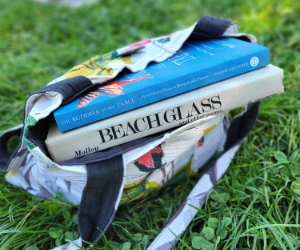My alarm was set for five a.m. but I was wide awake before it went off. I hadn’t slept much because I was too “excited”—excitement being what I’ve decided to call anxiety—about my live interview on Canadian morning television.
My publicist had booked me on what she called “the Today show of Canada” to talk about my memoir. It was just before Valentine’s Day and the angle would be Galantine’s Day for the newly divorced. This was a term I pretended to know when in fact I’d never heard of it. I did a quick Google search and discovered that there’s a Galentine’s Day and a Palentine’s Day—both made-up spins on a made-up holiday but, I have to admit, clever nonetheless.
There was really no reason for me to be nervous. The interview would last only five minutes and, thanks to the pandemic, here was a chance to be on national television without leaving the comfort of my own home.
I prepared everything the night before. My daughter set up her fancy selfie ring light for me. I did a test run of my headset and microphone and laid out my blouse and earrings. I carefully arranged the plants that would be visible behind me.
At six a.m. I was in place, awaiting the call from the show’s producer, who told me what to expect and then connected me with a technical guy who spoke into my earpiece and told me to back up, turn slightly, move the lamp, move that plant until I was “looking good.”
I appreciated his attention to detail.
When the interview began, I talked about were the little things that helped me get through the difficult, early days of my divorce: a cup of tea my friend made me; a bag of apple slices another friend gave me to nibble on when the nausea went away; the heated seats in my van that comforted me while I waited in the school pickup line for my kids, trying to wipe away my tears before they came out.
These details may seem trivial, but they are truly the moments that stand out for me in what is otherwise a blur of painful memories.
And, maybe not surprisingly, the viewers I heard from after the interview specifically thanked me for reminding them to look for small moments of grace. They appreciated the details.
It made me think about how important the little things are. This is true in life, of course, but also if you want to write about life.
Maybe that’s obvious, but too often, as writers, we doubt the details in our work. What does it matter how my character likes her coffee or whether she buys her clothes at a thrift store? we ask. Why would readers be interested in minutia?
The answer is: we just are. We want to know if other people are as neurotic, obsessive, distracted, outraged, sensitive, or inspired as we are.
Mostly, we want to feel something, and details convey emotion.
I watched a movie recently about a young man navigating his parent’s breakup. The camera lingered on the particular way his father squeezed his tea bag against his spoon every morning. Later it showed his son doing it the same way. It was subtle, but created a wonderful sense of how intertwined their lives were. It made me sad and hopeful and wistful. That’s a powerful cup of tea!
Every detail you include in your story is there because it has some kind of meaning. Each one is like a dot of color in a pointillism painting that forms a picture.
Ernest Hemingway said, “If a writer stops observing, he is finished. Experience is communicated by small details intimately observed.”
So keep observing. Keep writing. And if the details of my TV interview story interested you at all, you can see the appearance HERE.









